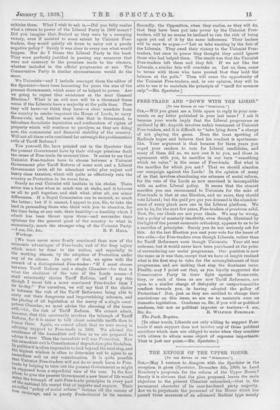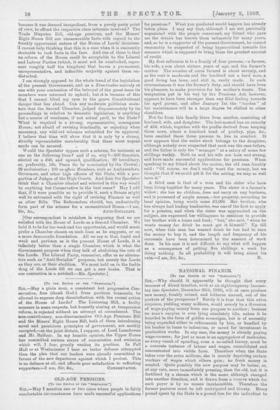THE REFORM OF THE UPPER HOUSE.
[TO TUN EDITOtt OY rue SFICOTATOR."} Sin,—May I venture to disagree with the Spectator is the reception it gives (Spectator, December 5th, 1908) to Lord Rosebery's proposals for the reform of the Upper House ? Surely it is obvious that the plan proposed, leaves the main objection to the present Chamber untouched,—that is, the permanent character of its case-hardened party majority. Are we to perpetuate the personnel of the House which has passed three measures of an advanced Radical type merely because it was deemed inexpedient, from a purely party point of view, to offend the respective class interests involved ? The Trade Disputes Bill, old-age pensions, and the Miners' Eight Hours Bill are unanswerable facts with regard to the 'frankly opportunist nature of the House of Lords' decisions. a cannot help thinking that this is a case when it is eminently aleairable to look facts in the face. And one of these is that no reform of the House could be acceptable to the Liberal .and Labour Parties (which, it must not be overlooked, repre- 'sent roughly half the kingdom) that leaves a permanent, unrepresentative, and inflexible majority against them un- 'dist urbed.
I am strongly opposed to the whole trend of the legislation of the present Government, and as a Free-trader entirely at one with your contention of the betrayal of the great issue its members were returned to uphold; but it is because of this that I cannot blind my eyes to the grave Constitutional danger that Ilea ahead. Can any moderate politician main- tain that the Second Chamber, judged dispassionately by its proceedings in relation to domestic legislation, is anything but a source of weakness, if not actual peril, to the State P 'What is required is a `strong, representative, courageous House; not afraid of revising drastically, or rejecting when necessary, any wild-cat schemes submitted for its approval. I believe that time will show that it is only by a strong, directly representative membership that these most urgent needs can be secured.
Would the Spectator oppose such a scheme, for instance, as one on the following lines P and if so, why P-200 Senators, elected on a 210, and upward, qualification; 80 hereditary, .or, preferably, life, Peers (to be nominated by the Crown) ; 20 ecclesiastics ; 100 ex.officie Members, such as Ambassadors, Governors, and other high officers of the State, with a pro- portion of Judges of the High Courts. And does the Spectator think that a Chamber elected and selected in this way would be anything but Conservative in the best sense P May I add that, if it were possible so to provide it, such a Senate might well be entrusted with the right of revising Finance as well as other Bills. The Referendum should, too, undoubtedly form part of the scheme for a reconstituted House.—I am,
[Our correspondent is mistaken in supposing that we are satisfied with the House of Lords as a Second Chamber. We hold it to be far too weak and too opportunist, and would much prefer a Chamber chosen on such lines as be suggests, or on a more democratic foundation. All we say is that, timid and weak and partisan as is the present House of Lords, it is infinitely better than a single Chamber, which is what the Government propose when they talk of abolishing the veto of the Lords. The Liberal Party, remember, offer us no alterna- tive such as "Anti-Socialist" proposes, but merely the Lords as they are, or their abolition. We must hold on to the feeble drag of the Lords till we can get a new brake. That is our contention in a nutshell.—En. Speetator.1













































 Previous page
Previous page